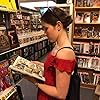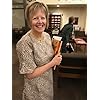Toni Morrison addresses the theme of racial self-loathing in the tragic story of the little black girl, Pecola Breedlove. Morrison's narrator doesn't explain why this self-loathing exists, but how, in Pecola's and her family's case, it came to be.
Pecola prays to God for blue eyes, thinking that others, including other blacks, will see her as pretty, like the little blue-eyed white girls. The use of the singular "eye" as opposed to "eyes" in the title brings Pecola's predicament into sharper focus. She is subject to the "eye" of the beholder, her life and dreams shaped by the narrowed perceptions of others.
As a previous reader noted, the play on same-sounding words, "eye" and "I" suggests another layer of understanding and underlines the notion of aloneness. And as titles go, "The Bluest Eye" is a more focused, intriguing, and dramatic title than "The Bluest Eyes" would be.
two of a thing cannot both be the -est..
Taken to represent what the ideal is, so it's a little more abstract?
Something a little out of reach and unattainable rather than a real world pair of eyes.
About Goodreads Q&A
Ask and answer questions about books!
You can pose questions to the Goodreads community with Reader Q&A, or ask your favorite author a question with Ask the Author.
See Featured Authors Answering Questions
Learn more








